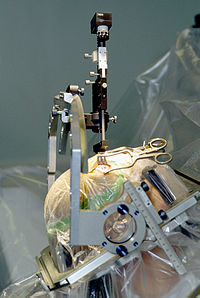
Photo from wikipedia
BACKGROUND Previous research has shown that anesthetic techniques can influence patient outcomes following cancer surgery. However, the effects of anesthesia in patients undergoing glioblastoma surgery are still not known. We… Click to show full abstract
BACKGROUND Previous research has shown that anesthetic techniques can influence patient outcomes following cancer surgery. However, the effects of anesthesia in patients undergoing glioblastoma surgery are still not known. We studied the relationship between the type of anesthesia and patient outcomes following elective glioblastoma surgery. METHODS This was a retrospective cohort study of patients who underwent elective glioblastoma surgery between January 2008 and December 2018. Patients were grouped according to the anesthesia they received, desflurane or propofol. A Kaplan-Meier analysis was conducted, and survival curves were presented from the date of surgery to death. Univariable and multivariable Cox regression models were used to compare hazard ratios for death after propensity matching. RESULTS A total of 50 patients (45 deaths, 90.0%) under desflurane anesthesia and 53 patients (38 deaths, 72.0%) under propofol anesthesia were included. Thirty-eight patients remained in each group after propensity matching. Propofol anesthesia was associated with improved survival (hazard ratio, 0.51; 95% confidence interval, 0.30-0.85; P = 0.011) in a matched analysis. Furthermore, patients under propofol anesthesia exhibited less postoperative recurrence than those under desflurane anesthesia (hazard ratio, 0.60; 95% confidence interval, 0.37-0.98; P = 0.040) in a matched analysis. CONCLUSIONS In this limited sample size, we observed that propofol anesthesia was associated with improved survival and less postoperative recurrence in glioblastoma surgery than desflurane anesthesia. Further investigations are needed to examine the influence of propofol anesthesia on patient outcomes following glioblastoma surgery.
Journal Title: PloS one
Year Published: 2021
Link to full text (if available)
Share on Social Media: Sign Up to like & get
recommendations!